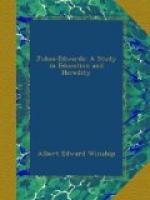When Colonel Edwards failed in 1815 he owed considerable sums of money and nine years later the courts released him from all obligations, yet between the age of 69 and 75 he paid every cent of this indebtedness amounting to $25,924.
The chief interest in Colonel Edwards centers in his children. When his failure came there were nine children, five boys and four girls. The youngest was a few months old and the eldest 19. Seven of them were under 12 years of age. In the first four years of their reverses two others were born, so that his large family had their preparation and start in life in the years of struggle. Nevertheless they took their places among the prosperous members of the Edwards family. The eldest son, William W. Edwards, was one of the eminently successful men of New York. He lived to be 80 years old and his life was fully occupied with good work. He was engaged in the straw goods business in New York; helped to develop the insurance business to large proportions; organized the Dime Savings Bank of Brooklyn, of which he was treasurer and cashier. He was one of the founders of the American Tract Society and of the New York Mercantile Library. He was a member of the State legislature for several terms.
Henry Edwards was one of Boston’s most eminent merchants and a most useful man. He had the only strictly wholesale silk house in Boston for nearly half a century. He was born in Northampton, 1798. At the age of fifteen he entered the employ of a prominent Boston importing house and began by opening the store, building the fires, and carrying out goods. By the time he was twenty he was the most trusted employee. He was a born trader. His brother in New York knowing that twist buttons were scarce in that city suggested that Henry buy up all there were in Boston before the dealers discovered the fact that they were scarce in New York and send them on to him. They cleared $500 in a few weeks. He was an earnest student. Not having had the advantages of an education he made up for it by studying evenings. They imported their silks from France which led him to study French until he was accomplished in the art of reading and speaking the French language. It is rather remarkable that learning the language in this way, he was able to go to France and out-rank most foreigners in Parisian society. An Edwards did not absolutely need the college and the university in order to be eminently scholarly in any special line.
At the age of twenty-five he went into business as the senior partner of the house of Edwards & Stoddard on State street, Boston. It was the only house that made its whole business the importing of silks. At the age of twenty-eight he went to Paris to purchase silks and remained there many years. They did a highly profitable business for nearly fifty years. He received much social attention while in Paris. General Lafayette was specially friendly, and the families visited frequently. He was also highly honored in Boston, where he was a member of the city government—it was an honor in those days—for nine years, one of the trustees of Amherst College for forty years, a member of the Massachusetts legislature and received several important appointments of trust and honor from Governor John A. Andrew and President Lincoln. Boston had few men in his day who were more prosperous or more highly honored.




